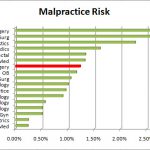Many trauma professionals believe that they can only be sued if they make a medical error and some harm occurs. Unfortunately, this is not entirely true. Yes, this is one obvious way to spark a suit or claim.
Unfortunately, it goes beyond that. Your patient may sue you if they even believe that they were harmed in some way, or think that something untoward happened while you were providing care. Here are the top 10 reasons for getting sued and my thoughts on each (in no particular order).
#1. “What we have here is a failure to communicate”
Your interpersonal skills are at least as important as your clinical skills! You may be a clinical prodigy, but if you are an asshole at the bedside, your patients will never appreciate your skills. You must be able to listen and empathize with your patient. Sit down, look at them eye to eye. Listen attentively. Don’t appear to be in a rush to get out of the room. You’d be surprised at how much more valuable information you will get and the relationship you create.
#2. “Work not documented is work not done”
This is my quote and it’s one of my favorites. Accurate, complete, timely, and legible documentation is a must! The legibility problem is fading with the widespread use of electronic health records (EHR, although this is creating new problems). Documentation, or lack thereof, will not get you sued. However, if you are involved in a suit or claim and your care is scrutinized, poor or missing documentation will make it impossible to plausibly contend that you did what you say you did.
It’s critical that you document every encounter thoroughly enough to be able to reconstruct what you were thinking and what you did. And providing a date and time is absolutely critical. This is especially important when the EHR timestamps everything you enter. Frequently, you will be documenting something somewhat after the fact. Always make sure that it’s not too far after the fact. Document as promptly as you can, and include the time that you were actually providing the service.
And never go back and try to “correct” your documentation, especially if the chart is being requested for inclusion in a suit or claim. If you believe there is an error, create an addendum and explain why the correction is necessary. If a suit or claim has been started, do not touch or open the chart without advice from your legal counsel.
Tune in for Part 2 in my next post!

